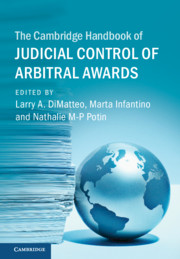Book contents
- The Cambridge Handbook of Judicial Control of Arbitral Awards
- The Cambridge Handbook of Judicial Control of Arbitral Awards
- Copyright page
- Dedication
- Concise Contents
- Contents
- Contributors
- Preface
- Part I Vacating Commercial Arbitration Awards
- 1 Introduction
- 2 Independence and Impartiality of Arbitrators
- 3 Exploring the Parameters of Conflicts of Interest
- 4 Procedural Irregularities and Arbitrator Misconduct during Proceedings
- Part II Enforcing Commercial Arbitration Awards
- Part III Scope and Interpretation of Arbitration Clauses
- Part IV Judicial Control of Arbitral Awards
- Part V Summary and Findings
1 - Introduction
Intersection of Courts and Arbitration
from Part I - Vacating Commercial Arbitration Awards
Published online by Cambridge University Press: 08 October 2020
- The Cambridge Handbook of Judicial Control of Arbitral Awards
- The Cambridge Handbook of Judicial Control of Arbitral Awards
- Copyright page
- Dedication
- Concise Contents
- Contents
- Contributors
- Preface
- Part I Vacating Commercial Arbitration Awards
- 1 Introduction
- 2 Independence and Impartiality of Arbitrators
- 3 Exploring the Parameters of Conflicts of Interest
- 4 Procedural Irregularities and Arbitrator Misconduct during Proceedings
- Part II Enforcing Commercial Arbitration Awards
- Part III Scope and Interpretation of Arbitration Clauses
- Part IV Judicial Control of Arbitral Awards
- Part V Summary and Findings
Summary
This chapter broadly reviews the relationship between the arbitration and judicial systems as well as substantive national laws that restrict the use of the arbitration process. The relationship is inherently in tension because two core principles are in conflict: independence of commercial arbitration and judicial intervention to ensure the fairness of the arbitration process. This chapter reviews and suggests how best to balance these two competing interests. This will include an analysis of the principle of separability (contract arbitration clauses are independent of the contract) and kompetenz–kompetenz (whether the arbitration panel or the courts are empowered to determine the jurisdiction of the arbitration panel and the scope of the arbitration clause). The chapter concludes by describing the structure and content of the chapters to follow and providing some final remarks. The editors would like to note that the scholarly contributors include some of the very best minds in legal scholarship. The list of contributors includes a diverse mix of scholars and practitioners from fifteen countries.
Keywords
- Type
- Chapter
- Information
- Publisher: Cambridge University PressPrint publication year: 2020

